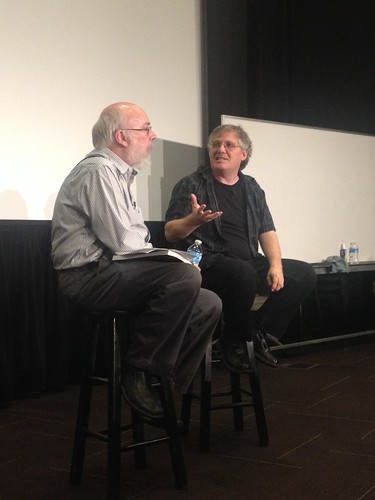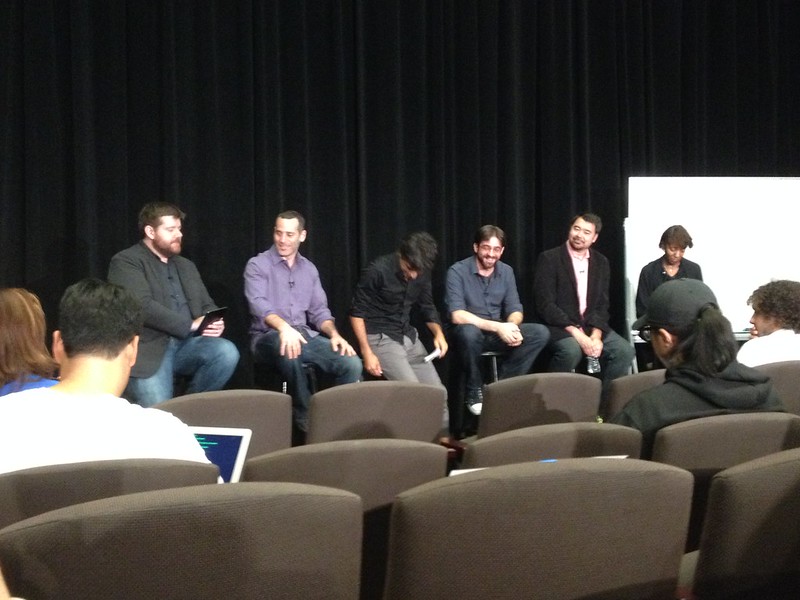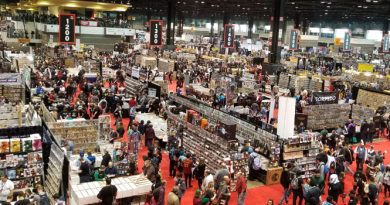Geek Speaks: The Future of Comics!

In 2000, Scott McCloud, author of Understanding Comics, produced Reinventing Comics, wherein he not only discussed the current state of the comic industry, he also made a few predictions about what the future held for the medium, incorporating the new technologies that computers and the Internet was bringing about.

Fourteen years later, crowdsourcing and HTML5 is changing the industry even more. Dr. Henry Jenkins, transmedia specialist and professor at the University of Southern California, decided to sit down with McCloud and revisit what makes up comics – seeing what he got right, what he got wrong, and where he sees the industry going in the next 15 years.
“I was obsessed with the possibilities for reinventing the commerce of comics, and reinventing the shape of comics online,” said McCloud as to why he wrote the book in the first place. Back in 2000, the World Wide Web was still relatively new, and no one was sure whether it would open up content or just be co-opted by the same media networks and be an even further funneling of content from the same companies. McCloud admitted that in today’s world, with mobile apps becoming more popular, that it’s a little bit of both ideas – especially with net neutrality under attack.
One of the positives the Internet has brought about has been diversity. “Diversity of content,” he quickly amended. “There’s a few different types of diversities, isn’t there?” He went on to explain that there are two different types of diversity in his mind. The first is front door diversity: this is making a specific comic about a specific topic – he gave the example of golf – that the comic creator then tries to get into comic stores, which then means the intended audience is already geared toward wanting to read comics. The second diversity is what he called side door, and it’s basically what makes many web comics popular: the creator just puts the comic online and the audience reads it because they like golf, not necessarily because they like comics. “As soon as content hits the web, it just shatters into a million tiny unique snowflakes of genres,” McCloud stated. “So the diversification thing: that happened. But that happened because of the open architecture of the Web.”
Another major revolution in the industry, though, is crowdfunding. Jenkins brought up that Kickstarter is considered the third largest publisher of comics in the United States. “For me,” McCloud said, “they are amplifying the one thing that I think that I got right early in on in terms of commerce, which is sort of an awareness of how much more power the consumer has when their dollar doesn’t have to go through that battery of an army of middlemen.”
Jenkins then turned the conversation to diversity not only of comics content, but of content creators as well. McCloud stated he stood by his informal prediction that within ten years, we’ll have a majority female industry. “That’s because girls read, number one; number two, a whole lot of girls read manga back in the day, and a certain significant minority of those grew up, went to art school, and are now making comics. And because there’s this all ages revolution that is majority female as well.” However, McCloud acknowledged that diversity in other ways – especially racial minorities – still needs to improve.
The discussion then moved on to the readability of comics in a digital world, with McCloud discussing how few comics online are distinctly different from their print counterparts. The online world is an “infinite canvas”, and HTML5 now adds so many more tools that can be used to tell stories online in graphic format, incorporating interactivity and personalization. He sees that it’s getting there, but that it’s going to take a little bit: “it takes people a while for people to even realize they can do something,” he said. However, he’s a bit leery of too much multimedia, as it then blurs the lines between comics and movies. This led into a discussion of how virtual reality, which Jenkins predicts is the next media revolution, will impact the industry.
Jenkins then asked what revolutions McCloud predicts will come next. “The real revolution now in the next ten years probably has a lot more to do with the ways in which comics will be joining with all art forms to survive,” he said. “Comics is just part of that picture. When it comes to commerce and control over people’s artistic ambitions, that’s something that all art forms are now joined at the hip in. That’s the real revolution now.”
The second half of the evening was a panel discussion moderated by Geoffrey Long of the Annenberg Innovation Lab. The panelists were Daniel Burwen (CIA Operation Ajax and Cognito Comics), Patrick Chappatte (editorial cartoonist for The International New York Times), Hank Kanalz (senior vice president of Vertigo), Joe Lefavi (Quixotic Transmedia), and Diana Williams (The Gatecrashers and Lucasfilm).

The panel covered lots of different topics, from format to the power of fandom. Leafavi talked about The Thrilling Adventure Hour, and their Kickstarted graphic novel, which at the time it ended was the fifth most-funded comics campaign in Kickstarter history. (Full disclosure: I am a Kickstarter backer for this project.) Kanalz followed up with the idea of digital distribution helping garner an accessibility to the audience that had never really been seen before. “Digital has broken down the barriers,” Kanalz said. “The creator has direct content with their fans.”
New tools to creators were also discussed, with everything from virtual reality to gamification of content. “Content is king,” WIlliams stated, “but it has to be good content.” Chappatte brought up the that the new tools give endless possibilities for journalistic comics. Leafavi liked the idea of new tools being used as a curation tool, helping discoverability. But the downside of technology was also discussed. Burwen stated, “Where do you draw the line between novelty and value? It takes a while for these things to kind of settle in and find their place. The problem now is that we have so much new stuff coming out all the time we don’t get a chance to pause a minute.” The panel agreed with all the new gadgets coming out that biggest thing for creators to remember is that they are tools first.
“The perception of what comics are and the kind of stories they deliver is evolving,” Lefavi stated. “As more people start to look at this not as what it looks like but more of what kind of content it’s delivering, it’s educating the market to get over the idea of what comics were and what they can be, and are continuing to evolve every day.”
This panel was the third in a new ongoing series held at USC. Jenkins plans on having an event each semester. You can see the videos of the prior two talks (the first, “The Uses (and Abuses) of Science Fiction”, which I covered here, can be viewed here; and the second, “The Women Who Create Television”, which I covered here and here, can be viewed through this page). The video of this panel will be available online soon. The spring 2015 event will be an all-day event focused on cyberpunk, combining screenings and workshops. For more information, visit the Annenberg Innovation Lab’s website.
Contact Angie here, and follow her on Twitter. You can see more of her writing on her website.
![]()


